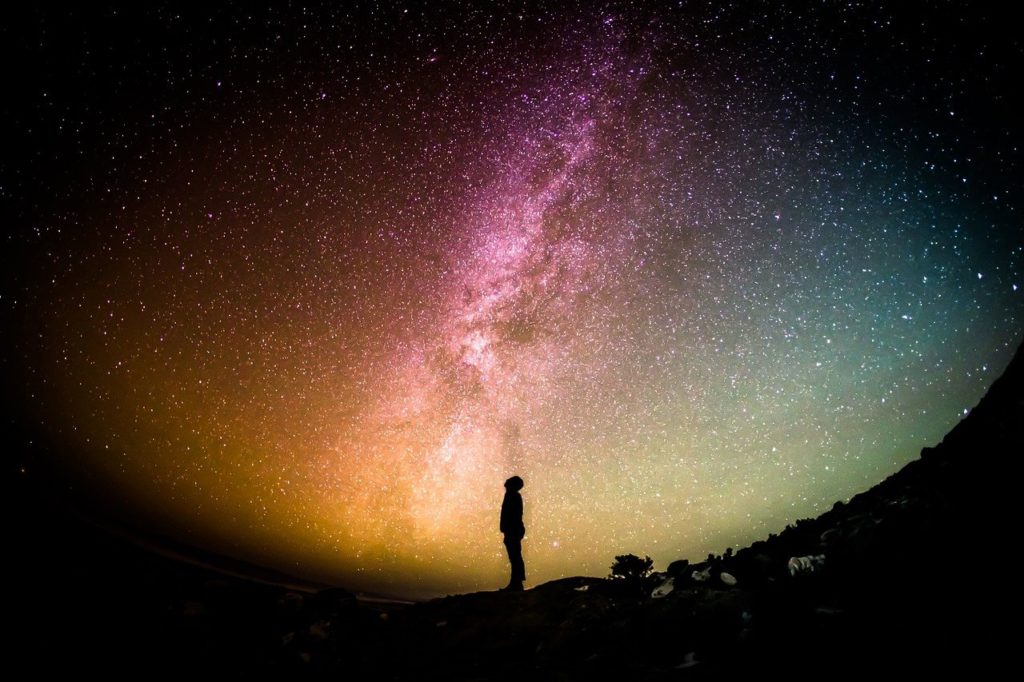by Laura K. Secor

Hello Friends,
Welcome back to the newest season of the UUCW! It fills me with warmth to resume our community. We had a pleasant summer, with all the wonderful heat and sunshine, but it was a sort of lonely summer for me. Although quarantine eased, the risks have not vanished, and our family is still keeping physical distance from others. Which feels like appropriate caution, but also lonely. Our teenager is full of anger for the state of the country, the state of the world, and I struggle to find words that will reassure them. When the world seems like a dumpster fire, is it even morally responsible to go for a walk at Tower Hill and re-friend all the trees?
Where we left off last spring, you and I, I had been talking with you about prayer, and especially where to address these prayers. I was struggling with the idea of a divine Over-Being, but similarly dissatisfied with the idea of a Great Nothingness. The last person to speak on the topic, last June, was Rev. John Gibb Millspaugh. He described his form of prayer, which was the celebration of the web of connections among the people in his life, and maybe humanity generally. I promised you that I would spend the summer considering whether that might be my form of prayer.
And over the summer, with the dearth of people in my physical life, I thought more about the planet, about Gaia, about the biosphere. I cast my net wide. People still sit in the front rows of my theater, but there is a whole earth mother filling out the auditorium. My desire to pray goes beyond prayer for my human community; it wraps around the entire third rock from the sun, and coasts out into the cosmos. The excerpt below gave me some sense of that journey, from the deepest reaches of space, and back to home, a journey best made in spirals.
First we hear from Reverend Burton Carley, then he quotes a poet you’ve seen before in these pages, Rainer Maria Rilke. I offer it here:
Reflections from the River by Rev. Burton Carley
Since the world feels like it’s in a kind of black hole, I was interested to read that researchers using NASA’s Spitzer Space Telescope have traced the building blocks of the universe back one more step and it leads to the massive black holes in space. We know that the Earth did not spring out of thin air but is essentially recycled matter and higher elements. The story of Genesis gets it right in the sense that we truly come from dust—space dust. But where did that dust come from?
Many galaxies have a black hole at their center and the researchers for the first time were able to see how a supermassive black hole in a galaxy 8 billion light years from ours was shooting out winds carrying dust composed of complex elements. The theory is that black holes suck in simple gases at high velocity where they collide and are superheated, fusing together to form complex molecule and grains of dust. Thrust back into space the dust eventually collects and forms stars and planets with the chemical compounds from which life can form.
From chaos come the building blocks for creation. It is something good to remember when spiritual storms are brewing inside our lives and also outside in the world environment. And how do we endure chaotic times? It seems counter-intuitive but it is through praise that we bear our transformations. The poet Rainer Maria Rilke understood this so well in the following poem translated by Albert Ernest Flemming:
O tell us poet, what it is you do?
—I praise.
But in the midst of deadly turmoil, what
Helps you endure, and how do you survive?
—I praise.
And that which nameless is, anonymous,
How do you, poet, still call out to them?
—I praise.
Who grants you your right to pose in any guise,
Wear any mask, and still remain sincere?
—I praise.
And that the stillness and the violence—
Like the star and storm—know and acknowledge you?
—because I praise.
We survive our deepest struggles because the human spirit rose from the dust with the possibility of joy and praise. It is why we come to church.
I don’t know that Reverend Carley’s offering will resonate with my angry teenager, but I find it resonates with me. I am not saying that I look at the world and fail to see the things that are so scary. But I can also see the wonderful other things that make up the complement of our world. I think prayer has to encompass it all – the good and the bad, the people and the planet, the ants and the cosmos, the terrifying and the comforting. Praise it all.
